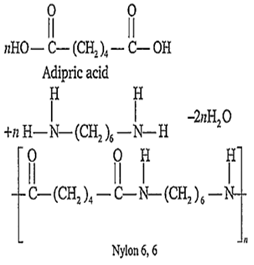 Multiple Choice Questions
Multiple Choice QuestionsWhich one of the following is not used as an initiator in ionic polymerisation?
NaNH2
SnCl2
AlCl3
(C6H5CO)2O2
Natural rubber is formed by polymerisation of which of the following?
Phenol
Isoprene
Chloroprene
Styrene
Nylon obtained by the condensation of adipic acid with hexamethylene diamine
nylon 6, 6
nylon 7, 6
nylon 6, 5
nylon 9, 7
A.
nylon 6, 6
Nylon obtained by the condensation of adipic acid with hexamethylene diamine is nylon 6, 6.

Polymerisation in which two or more chemically different monomers take part, is called
addition polymerisation
co-polymerisation
chain polymerisation
homo polymerisation
